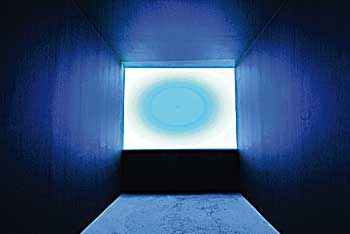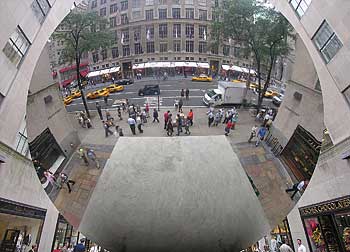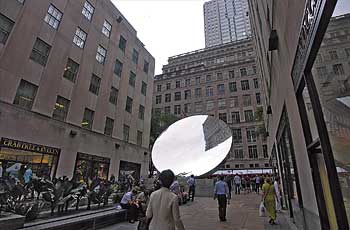Technology produces ever more extended systems spread out in space and without precise boundaries that are often evolutional and interconnected with other systems, both natural and artificial. Therefore the influence of the media and their control of our knowledge in modern-day culture cannot be ignored.

Wounds and absent Kapoor

Ski Mirror Anish Kapoor

Ski Mirror Anish Kapoor
|
|
The term was invented by William Gibson, coined in his novel Neuromancer. “Cyberspace. A consensual hallucination experienced daily by billions of legitimate operators, in every nation, by children being taught mathematical concepts... A graphical representation of data abstracted from the banks of every computer in the human system. An unthinkable complexity. Lines of light ranged in the non-space of the mind, clusters and constellations of data. Like city lights, receding...”.
The usefulness and predictions of science fiction, as sociology of the future, does not stop here. The term has been extremely fortunate. It has been used by scholars in all fields (engineering to sociology, philosophy to psychology) to describe the emerging reality of new digital and reticular technologies. This widespread use has helped create a new common ground on which a society is based. As with any common ground, however, it has lost specificity and is a sort of umbrella term applicable to various technologies and their different uses and misuses. So what do we mean by cyberspace?
Other than the current mass of technologies, cyberspace describes the set of communicative and therefore corporeal relations mediated by any technology in the age of digitalisation and telematic networks. This means we use the term to describe the tensive field of relations in which we are now immersed on a daily basis. Like every field, cyberspace does not exist as an empty container, independently of the vectors of force that structure it and are in turn influenced by it. In this sense, cyberspace is the post-metropolitan scenario of our social actions: Gibson’s reference to the lights of the city is clear.
Validity of interpretation is based exactly on this point. The term presents a condensed image not of a tool, as with terms that are still coined for new technologies (new media), the internet, the web, but of an environment in which we can live. The spatial metaphor is not just a metaphor, but also immediately affirms a different and more meaningful connotation of the argument. As living space, media are not foreign to our daily life but are fragments of the world that we inhabit, and can build the worlds of our life. It’s no coincidence that the latest developments in electronic technologies relate to the pulverization and distribution of technology in our homes (from ubiquitous computing to internet zero). Our metaphor is becoming a literal description of reality we make experience inadvertently and more frequently.
Gibson’s argument offers other points of interest. These include the irreducibility of cyberspace to a single key logic: hallucination is not induced by a centre, a Palmer Eldritch, as happens in the novel by Philip K. Dick, but is lived consensually; data is unbelievably complex and cannot be reduced to a single, palpable concept. The order commonly striven for by the beautiful number is made unstable by the console cowboys, by all of us. Cyberspace is contingent, it is the result of a non-linear series of contacts or connections. Its existence is not guaranteed by a foundation, instead the constant practice of the freedom and responsibility of choice permits this new aspect of life to develop and consolidate, to constitute itself as a home. This home, however, has no walls to prevent it from moving, or any windows that can be forced, and is disturbed by the constant transit of otherness which is all of us. The home is in a constant state of metamorphosis.
This daily inhabitable dimension of cyberspace and the irreducibility to a key logic prevents this technical-scientific venture from marking the opening of a new frontier that can be colonised. The frontier has marked the American imagination from the conquest of its land (the myth of the Far West) to that of outer space (space missions). The spirit of the frontier has undoubtedly played a decisive role in starting cyberspace and been indispensable for its creation: cyberspace has started a new frontier and environment. But cyberspace cannot be colonised as by nature it is virtual: cyberspace is not a utopia come to change the cosmism (the progressive myth of man’s conquest of the stars, able to unify the capitalist and communist spirits). The daily ability to upload your own information and download that of others (as with eMule) makes it impossible to consider cyberspace as a utopia. Cyberspace is the opening of another world that filters into our own, daily world. |
